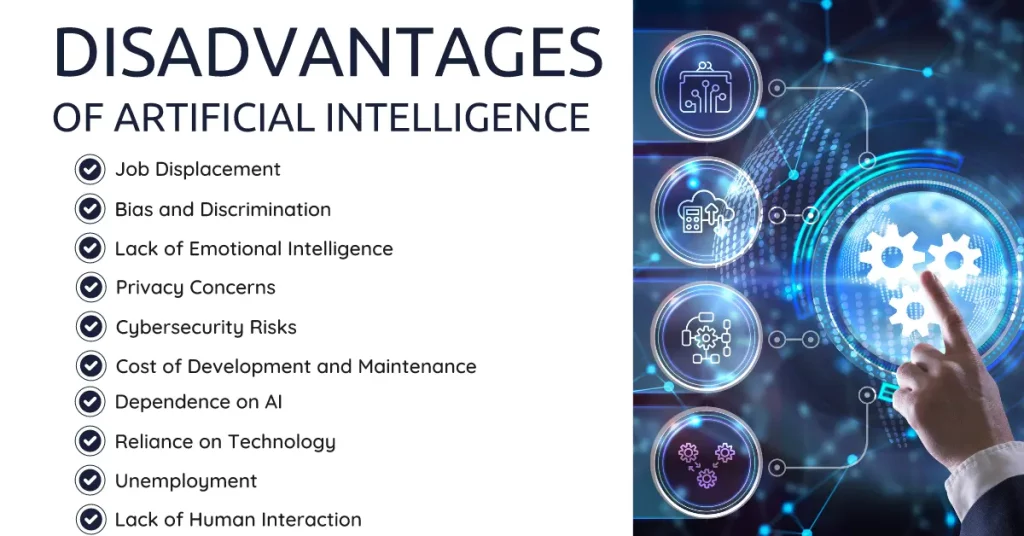Are you concerned about how Artificial Intelligence (AI) is becoming more and more prevalent in our daily lives? As AI develops further, there are several potential negative effects that we should be aware of. We’ll examine the Ten Drawbacks of Artificial Intelligence in this essay. Ten Drawbacks of Artificial Intelligence and What They Mean for Society is the title. This manual will cover everything, from job losses to privacy issues. Learn about the ten drawbacks of artificial intelligence. Ten drawbacks of artificial intelligence and their effects on society are titled. This thorough guide covers everything, from job displacement to privacy concerns. Read on to find out more.
Introduction
Each day, artificial intelligence gains in popularity and sophistication. It can significantly improve our daily lives and transform a number of industries. These developments do, however, involve a number of potential downsides that might have a big influence on society. We’ll examine the Ten Drawbacks of Artificial Intelligence in this guide. Describe the top ten drawbacks of artificial intelligence and how they might affect the future.
Ten Disadvantages of Artificial Intelligence
Let’s examine each of these potential downsides in more detail now that we’ve studied the Ten Disadvantages of Artificial Intelligence Title of Ten Disadvantages of Artificial Intelligence.

1.Job Displacement
The possibility of job displacement is one of the biggest worries concerning AI. Many tasks that are currently performed by humans can be automated by AI, which will result in a large loss of jobs. Low-skilled workers could be particularly negatively impacted by this since they do not have the ability to move to new roles.
It’s crucial to remember, though, that not all jobs will be eliminated by AI. Some tasks require human abilities that AI cannot imitate, such as emotional intelligence or creativity. As a result, AI will likely lead to the creation of new jobs, however, it might take some time for these jobs to materialize.
2.Bias and Discrimination
The potential for bias and discrimination in AI is a serious worry. Since AI algorithms can only be as objective as the data they are trained on, biased data will result in biased AI. Discrimination in recruiting procedures, lending policies, and even criminal sentences could result from this.
It’s crucial to make sure AI is educated on objective data to solve this problem. This can entail gathering more varied data sets or creating new, less biased algorithms.
3.Lack of Emotional Intelligence
Although AI excels at analyzing vast amounts of data and drawing conclusions from it, it lacks emotional intelligence. Human contact requires emotional intelligence, which cannot be replicated by machines. We might observe a loss in emotional intelligence in society as AI becomes more pervasive.
It’s crucial to make sure that people continue to give emotional intelligence priority in their interactions with others to solve this problem. This could entail creating brand-new school curricula with an emotional intelligence component or incorporating emotional intelligence into training programs for the workplace.
4. Privacy Concerns
Privacy is a big issue with AI. For it to work, AI needs data, and the more data it has, the better it can function. However, there are serious privacy issues brought up by this reliance on data. As AI gathers more information, there is a chance that this information may be utilized for illegal activities like identity theft or monitoring.
It’s crucial to make sure that privacy is considered when developing AI in order to solve this problem. This might entail introducing new
5.Cybersecurity Risks
AI is a growing target for cyberattacks as it grows more commonplace. AI systems are susceptible to hacking, which might have terrible repercussions. For instance, a hacker could influence an AI system to make bad decisions or break down.
Making sure that AI systems are designed with robust cybersecurity protections in place is crucial to resolving this issue. This can entail putting new security measures in place or creating new, more secure AI algorithms
6.Cost of Development and Maintenance
The expense of creating and maintaining AI systems may prevent many organizations from using them. In addition to initial creation, continuing maintenance, upgrades, and training are all included in the cost of AI development.
Investigating new funding strategies for AI development is crucial to finding a solution to this problem. Government or commercial financing for AI development may be involved.
7.Dependence on AI
There is a chance that as AI spreads, people will grow unduly reliant on it. This can result in a loss of creativity and critical thinking abilities. In the worst-case scenarios, humans might stop being able to function without AI.
Making sure that people continue to value creativity and critical thinking skills is crucial to solving this problem. This can entail creating fresh curricula or incorporating critical thinking abilities into programs for workplace training.
8.Reliance on Technology
Society depends more and more on technology as AI grows more common. When technology fails and there is no human backup, this dependency may be harmful. Furthermore, if AI systems develop too much, they can become difficult to comprehend and maintain, which could result in issues.
9.Unemployment
Numerous jobs may be automated by AI, which could result in massive unemployment. While AI may result in the creation of new jobs, it is unclear how many jobs would be lost in the process.
It’s crucial to investigate new employment models that place a focus on job development in order to address this problem. This could entail public funding for programs that train people for jobs or the creation of new, less automated industries.
10. Lack of Human Interaction
There is a chance that as AI spreads, humans will become more and more alone. AI can be a great source of knowledge and pleasure, but it cannot replace the value of interpersonal communication.
It’s crucial to make sure that people continue to value human interaction in order to solve this problem. Creating new social programs or policies that place a priority on community building may be necessary for this.
Conclusion
While AI has the potential to revolutionize numerous industries and vastly improve our lives, it’s crucial to be aware of any potential downsides and seek to address them. These are the top ten drawbacks of artificial intelligence. Ten Drawbacks of AI are discussed in this article, including cybersecurity risks, development and maintenance costs, dependence on AI, unemployment, a lack of human interaction, unintended consequences, bias and discrimination, privacy concerns, complexity and lack of transparency, and the possibility of weaponization. We can make sure that AI is created and used morally and responsibly which helps the entire society by addressing these issues.
FAQ’S
Q1: What are the potential drawbacks of artificial intelligence?
A1: Artificial intelligence, despite its numerous advantages, comes with several disadvantages. These include job displacement, ethical concerns, lack of human judgment, security risks, and potential biases.
Q2: How does artificial intelligence contribute to job displacement?
A2: Artificial intelligence has the capability to automate various tasks, which can lead to job displacement in certain industries. Jobs that involve repetitive tasks or are easily programmable are particularly at risk.
Q3: What are the ethical concerns surrounding artificial intelligence?
A3: Ethical concerns in artificial intelligence revolve around issues like privacy invasion, surveillance, data misuse, algorithmic biases, and the potential for autonomous systems to make ethically questionable decisions.
Q4: What are the limitations of artificial intelligence in terms of human judgment?
A4: While artificial intelligence systems can process vast amounts of data and make predictions, they lack human intuition, common sense, and emotional understanding. These limitations can affect decision-making in complex or ambiguous situations.
Q5: What are the security risks associated with artificial intelligence?
A5: Artificial intelligence systems can be vulnerable to cyber-attacks and hacking attempts. If not properly secured, they can become targets for malicious actors aiming to manipulate or exploit the system for their own gain.







